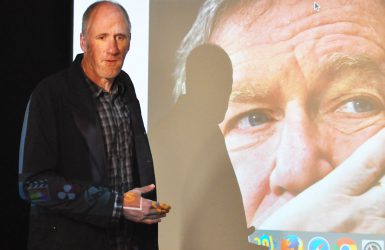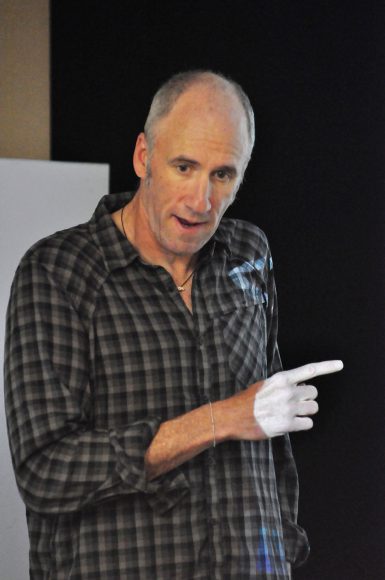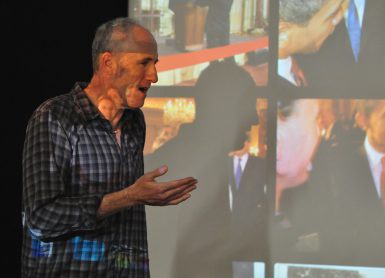Holbrooke describes documentary filmmaking

The wealth of ways to show one’s work makes this the best time to be a documentary filmmaker, David Holbrooke told a small group of students Thursday at Franklin Hall.
“There are so many outlets that you can use, you don’t need all of the gatekeepers anymore,” said the independent filmmaker during a master class for Media School students gathered that morning.
Holbrooke visited campus as the IU Cinema’s Jorgensen Lecturer, showing his film, The Diplomat, as well as speaking to audiences and groups of students during the day. For the master class, Holbrooke focused on how he made the film, which is about his father, the late Richard Holbrooke, a career diplomat best known for his work in reaching the 1995 Dayton Peace Agreement that ended the war in Bosnia.
“He was a huge figure in the world and in people’s lives,” said Holbrooke of his father. “But he was also a complicated guy. My relationship with him was complicated especially toward the end.”
In fact, it took a while after the elder Holbrooke’s death for Holbrooke to even consider making a movie about something so personal. But he said he knew that if he didn’t do it, someone else would and that would be something he wouldn’t be able to bear watching.
The film delves into the life and work of Richard Holbrooke, who began his career in South Vietnam for the Johnson administration. His final assignment was as a special advisor on Pakistan and Afghanistan to President Barack Obama and Secretary of State Hillary Clinton. He was the U.S. ambassador to Germany from 1993 to 1994. He died in 2010.
For the film, Holbrooke talked to about 75 people, ranging from close family members to politicians such as Bill and Hillary Clinton and Henry Kissinger.
Holbrooke said talking to these people who worked with his father professionally taught him the most about the elder Holbrooke.

“He was working so much that, in a way, his colleagues were his family,” he said. “Talking to these people gave me a sense of what kind of guy he was when he worked.”
But this documentary was more than a film about a diplomat. The film also chronicles the journey of a son finding out who is father really was.
“Putting myself in the story was tricky,” Holbrooke said. “But it made the film more approachable. The story is that this is a son who is trying to understand his father. It’s a universal message.”
Holbrooke said he made the movie for three reasons: to inspire a new generation of diplomats, for his grandchildren to better understand him and to give his father a voice. However, because he had not considered such a film before his father’s death, Holbrooke never got a chance to actually interview the man.
“I wish I had interviewed my dad while he was still alive,” he said. “He had so much to teach my kids and the world.”
With that in mind, Holbrooke encouraged students to interview their parents while they’re still alive, saying everyone should try to get to know their parents as best they can.
Holbrooke offered general advice about filmmaking as well.
“You need to be bold as a filmmaker,” said Holbrooke. “Today, we need hope and that comes from stories.”
Holbrooke added that all stories matter, no matter who they are about or how small the production. It doesn’t matter if the film is about a relative or a fascinating stranger, if the story is captivating and the characters intriguing, the story is worth telling.
His other works include Hard as Nails, Freaks Like Me, Time for a New God and A Redwood Grows in Brooklyn. He also has worked in television news, producing long-form pieces for news networks.

Holbrooke also told the group about his “day-job” as director of Telluride Mountainfilm, a film festival for independent documentaries. He encouraged students to visit the website (http://www.mountainfilm.org/) to check out the movies as well as sign up to volunteer, so they can attend for free and mingle with the filmmakers.
“If you come, you’ll be blown away,” he said. “People are accessible there. Documentary makers are the best people, even if they are a little wild-eyed.”
Near the end of his session, Holbrooke offered his best advice.
“If you wanted to know what my big lesson is,” he said, “it’s to be bold. Be curious.”
Holbrooke’s visit was sponsored by The Media School, the School of Global and International Studies and IU Cinema. In addition to the master class, Holbrooke talked at SGIS in the afternoon and discussed The Diplomat after a screening at IU Cinema in the evening.

